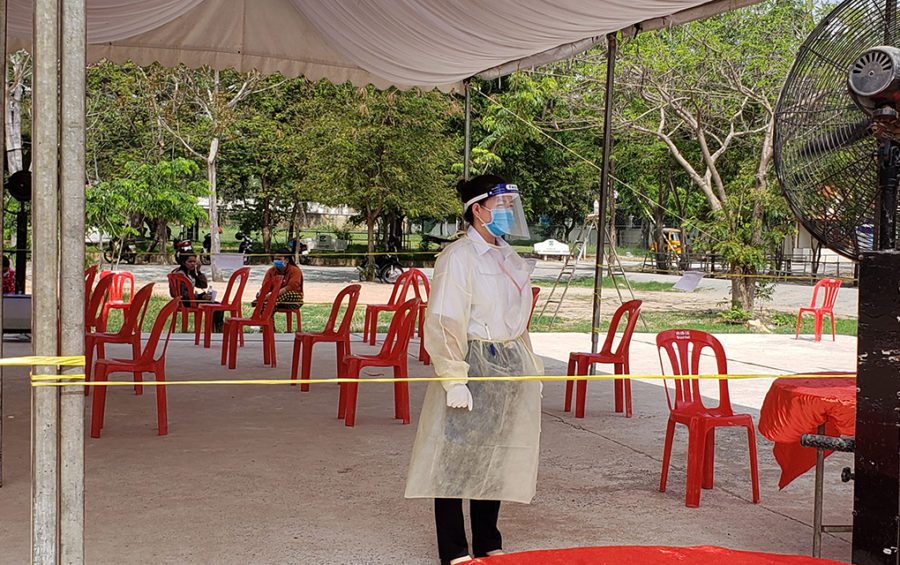About 800 samples were tested for Covid-19 in Cambodia last week — less than half of the number tested the week before — while Health Ministry and WHO representatives on Monday said that the country remains at risk for outbreaks and needs to adjust to a “new normal.”
No new cases of the novel coronavirus have been reported in Cambodia for more than three weeks, and testing last week dropped to about 115 samples per day on average, according to the latest test figures from the Health Ministry.
Some 12,378 samples were tested for the virus from January up until Sunday, Health Minister Mam Bunheng told reporters during a press conference on Monday.
While nearly 1,800 samples were tested from April 20 to 26, just 802 were tested in the past week, according to ministry data. The nation’s designated testing laboratories are capable of processing about 600 samples per day, officials have said.
Bunheng said the public needed to take precautions while traveling, avoid large gatherings and remain vigilant to avoid further community transmission of the virus and potential loss of life.
People should change their behaviors by folding preventative health measures into their daily lives, the minister said, noting the importance of maintaining good hygiene habits by washing with soap and water or alcohol-based hand sanitizer and practicing social distancing.
“Before, we would go anywhere, we did not wear face masks, but now we have to wear face masks. Wherever we stayed close to each other, we shook hands [but] now, we have to change to a new behavior,” Bunheng said. “In the past, friends always hugged each other when they met each other, so we need to change our way of living.”
Entry bans on those traveling from Italy, Spain, France, Germany, the U.S. and Iran will remain in place until the pandemic situation improves, he added.
Last week, Heath Ministry spokesman Ly Sovann said more than 1,500 individuals were tested among the 1,784 Covid-19 samples taken in the week prior. But the number of tests was more than halved in the past week, falling “because we have no more positive cases so there are no more direct and indirect contacts,” Sovann said on Monday.
Still, he said, of the 10,936 individuals who have been screened for the virus since January, people tested have included not only those known to have had contact with positive patients, but also people hospitalized with pneumonia, those with the common cold and other suspected cases.
Two weeks ago, Li Ailan, the World Health Organization’s (WHO) country representative, said the ministry had been advised to expand contact tracing and testing, and “start active case finding.”
She told reporters on Monday that the Covid-19 pandemic was “far from over, globally and in Cambodia.”
“If there is an outbreak in another part of the world, we are at risk. We are not safe,” Li warned.
Globally, more than 3.3 million people have been infected with the virus and 238,000 people have died, according to the WHO.
“The Covid pandemic is still a public health emergency of international concern,” WHO’s highest level of alert, which was declared in late January, Li said.
She agreed with Health Minister Bunheng: “We cannot go back to where we came from, just to go back [to] normal. We have to create a new normal.”
Only two of the 122 people who have tested positive for the respiratory disease in Cambodia since January remain in quarantine: a 75-year-old man in Kampong Chhnang and a 36-year-old woman in Banteay Meanchey, both of whom have been receiving treatment for more than a month, according to ministry statements.
Sovann, the spokesman, said the woman was tested more than 10 times, but is still positive, although both patients were in stable condition.
Bunheng said factors, such as other illnesses as well as the man’s age, were slowing the patients’ recoveries.
Asked when schools may reopen, which had been shuttered since mid-March to limit the spread of the virus, Bunheng referred questions to the Education Ministry.
Ministry spokesman Dy Khamboly told VOD that no date had been set for schools to reopen and the matter was still under consideration, depending on the Covid-19 situation.
The ministry has introduced online learning and other forms of at-home study for kindergarten to high school students via various platforms, including Facebook, YouTube, TV and radio, Khamboly said.
“We want the students who are able to use smartphones and to use computers, and some without smartphones, are able to use TV or gather in a small group less than 10 [to study],” he said.
The spokesman said he could not yet evaluate the effectiveness of these programs.
Youk Sambath, a secretary of state at the Health Ministry, said the Finance Ministry has allocated $60 million in Covid-19 response funding for the year.
About $8.5 million has gone toward equipment costs while nearly $3 million supported front-line civil servants so far, Sambath said.
Private donors, civil servants, development partners and foreign governments have also contributed some $35 million in total.
Li, from WHO, again commended Cambodia’s initial response to the pandemic, but said now was the time to ready the nation for a potential rise in cases.
“It’s now the new window of opportunity for all of us to prepare for [the] possible next wave in Cambodia.”
Additional reporting by Matt Surrusco













